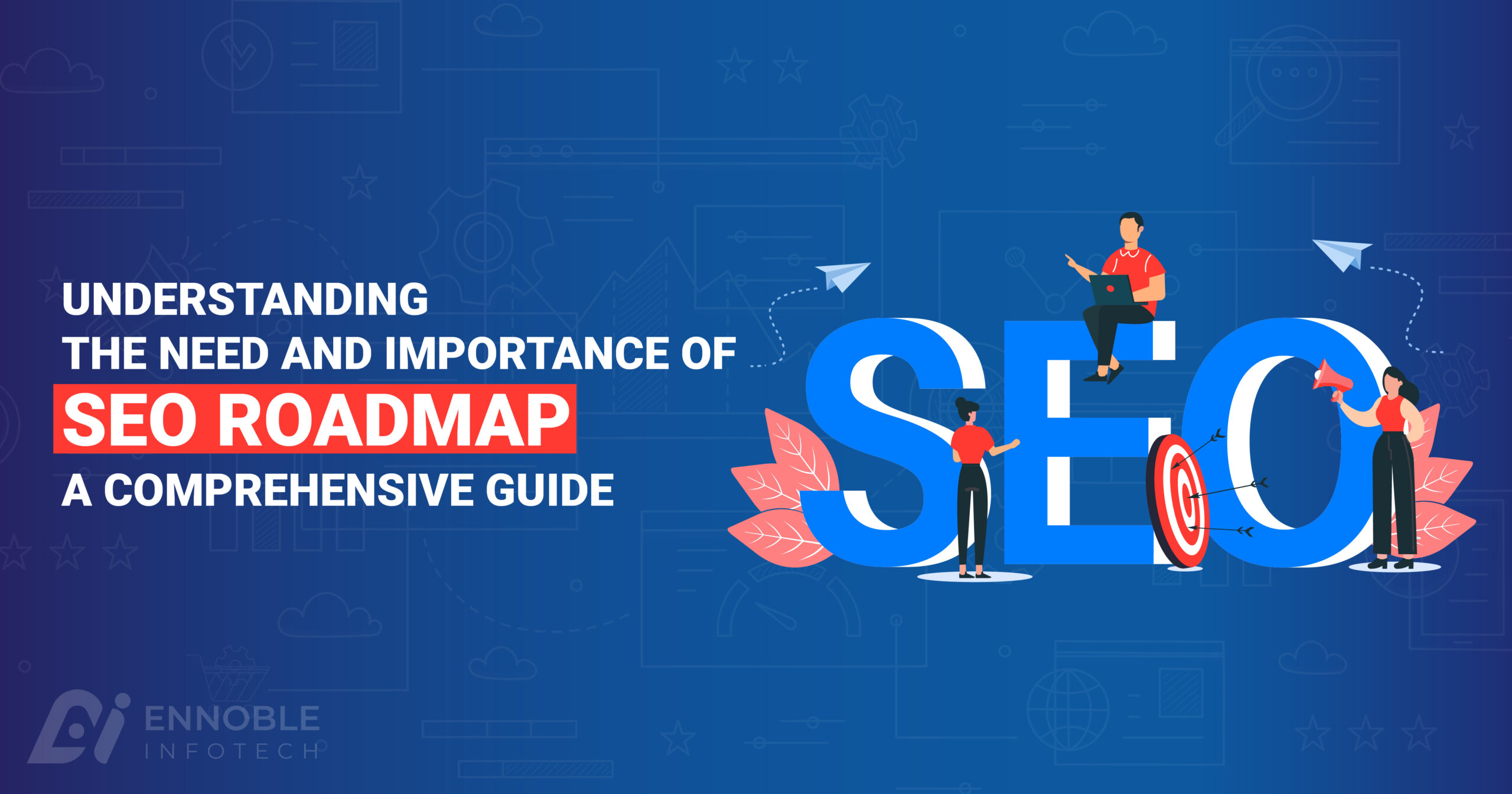SEO Roadmap is vital to ensure the success of any search engine optimization campaign. It is a document that elaborates your SEO strategy in words to reminisce a blueprint. This is a well-extended guide to cover the significance and need for an SEO roadmap in the digital landscape. Stay connected!
Build a Success-Oriented SEO Roadmap with Ennoble Infotech! Call Now: +918699258381
What is an SEO Roadmap?

As its name suggests, an SEO roadmap is similar to a map that we use while traveling from one place to another. It includes directions, various routes, turns, landmarks etc. to help you reach your destination.
Need more clarification? Here is a simple definition:
An SEO roadmap is a strategic plan or document that outlines the specific actions, goals, and timeline for a Search Engine Optimization (SEO) campaign. Being a prominent part of SEO services, it helps SEO professionals achieve their objectives in a structured and organized manner.
You’ll find crucial information on workflows, due dates for each task, individuals responsible for each job and more in a well-detailed SEO roadmap strategy. It is also referred to as a ‘living’ document. You are free to make necessary amendments if needed since an SEO strategy requires continuous development.
Importance of an SEO Roadmap for SEO Professionals

It can be beneficial for SEO professionals in the following ways:
Clear Direction
It provides a clear and well-defined direction for SEO efforts. It outlines the overall goals and objectives of the campaign and allows professionals to align their efforts with the desired outcomes.
Prioritization
It helps professionals prioritize tasks and activities based on their importance and impact. It identifies the most critical areas that require attention to ensure that resources are allocated effectively.
Timeline
It includes a timeline or schedule for when specific tasks and milestones should be completed. This timeline helps SEO professionals manage their time efficiently and ensures that they stay on track to meet deadlines.
Task Assignment
In team settings, a detailed roadmap for SEO often assigns specific tasks and responsibilities to team members. This ensures that everyone knows their role and contributes to the campaign’s success.
Resource Allocation
It helps SEO professionals allocate resources such as budget, personnel, and tools appropriately. This prevents resource wastage and ensures that the necessary tools and manpower are available when needed.
Keyword and Content Strategy
It typically includes keyword research and content strategy. This helps professionals identify target keywords, create content plans, and optimize existing content for better search engine rankings.
Technical SEO
Technical SEO tasks, such as website audits, site speed improvements, and mobile optimization, are often outlined in the technical SEO roadmap. This ensures that technical issues are addressed systematically.
Monitoring and Reporting
The roadmap often includes provisions for ongoing monitoring and reporting. SEO professionals can also track the progress of their efforts, measure key performance indicators (KPIs), and make data-driven adjustments as needed.
Adaptability
They are not set in stone; however they should be adaptable to changes in the search landscape and business goals. SEO professionals can modify the roadmap as needed to respond to algorithm updates etc.
Communication
It serves as a communication tool within the SEO team and with other stakeholders. It helps ensure that everyone is on the same page regarding campaign objectives and progress.
Link Building and Off-Page SEO
For off-page SEO efforts, the roadmap may include plans for link building, outreach, and social media engagement. These strategies are crucial for building authority and improving search rankings.
Accountability
By specifying tasks, timelines, and responsible parties, the roadmap holds team members accountable for their contributions. This accountability fosters a sense of ownership and responsibility for the campaign’s success.
Creating an SEO Roadmap – Various Steps Involved
Creating a roadmap SEO is a critical step in developing and executing a successful search engine optimization strategy. It helps you plan and prioritize your efforts, set clear goals, and track your progress.
But how to develop a successful SEO roadmap?
Here’s a step-by-step guide to creating an SEO roadmap:
Goal Understanding
Start by understanding your overall business objectives. Your SEO strategy should align with and support these goals. For example, if your goal is to increase online sales, your SEO roadmap should focus on improving e-commerce visibility.
SEO Audit
Before creating a roadmap, assess your current website’s SEO performance. Identify strengths, weaknesses, and opportunities. Use SEO tools like Google Analytics, Google Search Console, and third-party SEO software to gather data on your site’s performance, rankings, and traffic.
Keyword Research
Identify relevant keywords and phrases that your target audience is likely to use when searching for your products or services. Use keyword research tools like SEMrush, Ahrefs, or Google’s Keyword Planner to find keywords with high search volume and low competition.
Competitor Analysis
In the realm of digital marketing services, you need to analyze your competitors’ websites to understand their SEO strategies. Identify what keywords they are ranking for, their backlink profiles, and content strategies. This information can help you find gaps in your own strategy.
Set Clear Goals
Define specific, measurable, and time-bound SEO goals. For example, you might aim to increase organic traffic by 20% within six months or rank in the top three positions for specific keywords.
Prioritize Tasks
Based on your audit, keyword research, and goals, prioritize the SEO tasks that will have the most significant impact on your website’s performance. Create a list of actionable items and prioritize them based on importance and feasibility.
Timeline
Assign realistic timelines to each task or goal. Be sure to consider resource availability and the complexity of each task. Create a schedule that outlines when each task should be completed.
Technical SEO Optimization
Address technical SEO issues such as site speed, mobile-friendliness, crawlability, and indexability. Ensure that your website is search engine-friendly by fixing any technical errors.
On-Page SEO
Optimize individual web pages by incorporating target keywords into titles, headings, meta descriptions, and content. Ensure that your content is high-quality, relevant, and engaging to users.
Off-Page SEO
Focus on building high-quality backlinks from reputable websites. Develop a link-building strategy that includes guest posting, outreach, and partnerships.
Content Strategy
Plan and create valuable, informative, and engaging content that addresses user needs and aligns with your keyword strategy. Consider creating a content calendar to ensure a consistent flow of content.
Monitoring and Analytics
Implement tracking and monitoring tools to measure your SEO progress. Regularly review your analytics data to see if you are meeting your goals and adjust your strategy as needed.
Continuous Optimization
SEO is an ongoing process. Regularly review and update your local SEO roadmap to adapt to changes in the search landscape, algorithm updates, and shifting business goals.
Reporting
Create regular SEO reports to track key performance indicators (KPIs) and provide insights to stakeholders. Include data on traffic, rankings, conversions, and ROI.
Communication and Collaboration
Ensure that all team members involved in SEO efforts are aligned with the roadmap and understand their roles and responsibilities. Regularly communicate progress and updates.
Stay Informed
Stay up-to-date with the latest SEO trends, algorithm updates, and industry best practices to continuously refine your SEO roadmap.
SEO Roadmap – Frequently Asked Questions (FAQs)
>> Q) What is an SEO roadmap?
An SEO roadmap is a strategic plan that outlines various efforts, goals, and timelines on the paper to achieve the desired results through an SEO campaign.
>> Q) How does an SEO roadmap help SEO professionals?
An SEO roadmap allows professionals to set and monitor various tasks, roles that are aligned with the targeted results. It ensures a clear understanding of an SEO campaign as a whole.
>> Q) What are the various crucial factors to consider while creating an SEO Roadmap?
Creating an SEO roadmap, generally, includes factors i.e. goal setting, SEO audit, keyword research, competitor analysis, timeline setting, content strategy etc.
The Bottom Line
Indubitably, an SEO roadmap is a strategic plan that helps SEO professionals and teams organize, plan, and execute their SEO efforts more effectively. It also provides a structured framework for achieving SEO goals, ensures efficient resource allocation, and helps adapt to changes in the digital landscape. Ultimately, it contributes to improved search engine rankings, increased organic traffic, and better online visibility for websites and businesses.
Are you looking for professionals to build a success-driven SEO roadmap for your business? You can get in touch with Ennoble Infotech to meet your purpose more compassionately. It is an experienced digital marketing company with a squad of specialized SEO experts and digital marketers. They will assess your business needs to draft a well-aligned SEO roadmap to attain your business goals within deadlines.
More Related Posts

Explore the Insights About SEO Success And Its Basic Elements

Understanding the Need and Importance of SEO Roadmap – A Comprehensive Guide

Instagram Threads Magic: Elevate Your Engagement with Irresistible Conversation Chains

Amazon SEO – Strategy for Beginners

On-Page SEO Checklist 2023 – The Ultimate Guide


